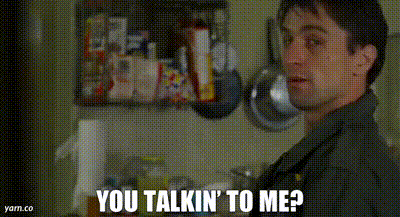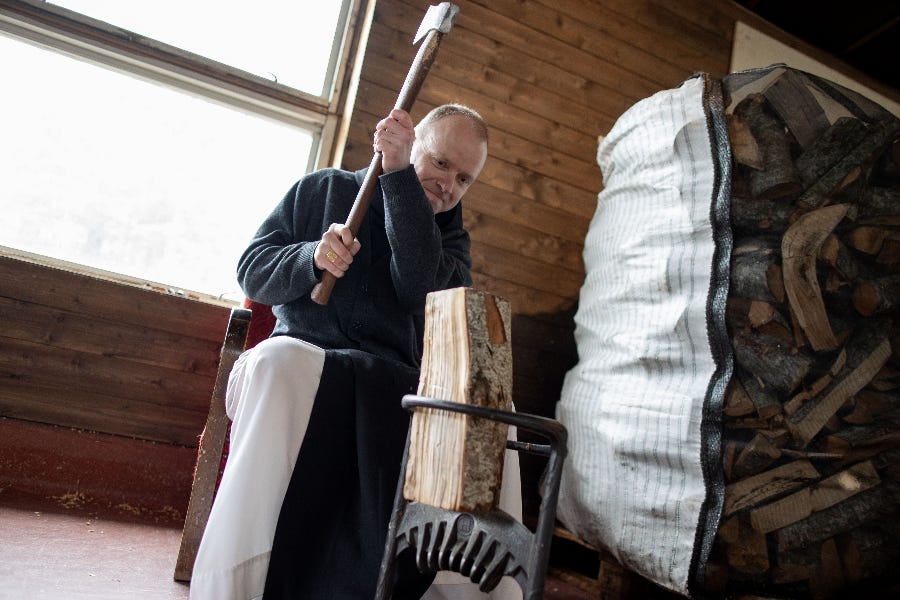Happy Friday friends,
And hello from Indianapolis airport.
Last night we had our post-holy hour happy hour live show and I’m still processing it.
Hundreds of people showed up, and it would make no sense if everyone at the Slippery Noodle last night was there just because JD and I were there. They weren’t — obviously.
Everyone who came last night was there, together, as kind of an extension of the communion going on at the stadium around the corner. And that was what made the night something different.
The Pillar, as a publication, has to do the news — freely, fairly, faithfully. That’s its primary purpose.
But The Pillar can only do that, if it grows out of a Catholic society that wants that kind of reporting, that sees truth and fact and honest analysis as points of communion, not vehicles for division.
Creating a focal point for a real Catholic community was not on our checklist when we opened The Pillar three and a half years ago — it’s just something the Lord decided to do with it along the way, and I’m deeply grateful.
I’m grateful I have a place like this at which to show up for work every day. But I am so much more grateful for all the people who showed up last night — and who show up for The Pillar everyday as subscribers.
It’s not that we couldn’t do this without you guys, it’s you guys — all of us, together — who are The Pillar, and who make it what we most want it to be: authentically Catholic.
Thank you all.
And if you’ve been a fellow traveler for a while now, there is no better crowd to be a part of.
Come on and join us.
Here’s the news
The News
The big story this week is obviously the National Eucharistic Congress here in Indy.
We’ve got a full court press here in town, with JD filing daily dispatches which you can read here. More to come.
—
Away from the Congress, several archbishops have made public statements more or less directly accusing the general secretary of the USCCB of “duplicity.”
While Fuller noted in his letter to all bishops that the layoffs had been discussed, albeit not in detail, during executive session at the bishops’ plenary assembly in June, the three prelates maintain no such notice was given.
While the affair hasn’t made many headlines elsewhere, it is kind of a big deal, as I noted in an analysis this week.
For a start, it’s an extraordinary (and extraordinarily selective) breach of the confidentiality of executive session by the archbishops — I can tell you from experience that even vague inquiries about the closed door conversations are usually met with cold fury from bishops.
If the new standard is that bishops talk freely about what was said — or alleged not said — when the mood strikes them, it somewhat makes a mockery of the closed door premise of the thing.
More specifically in this case, the bishops have publicly called the honesty of the general secretary into question, not a question which you would like can go unanswered. Though, of course, Fr. Fuller doesn’t have the same latitude to speak out in his own defense as the archbishops, which they will have known when they made their comments.
That said, executive sessions are minuted, and Fr. Fuller’s comments will likely have come from a prepared text. So the record is there to be consulted, if the conference’s episcopal leadership should choose to do so.
You can read the whole analysis here.
—
The Chaldean Catholic Church has been meeting in synod this week and urged their flocks worldwide to show “unity and togetherness.”
Although based in Iraq, the Eastern Church has a large diaspora community following the U.S.-led invasion of the country in 2003 and Islamic State’s advance in 2014. Hundreds of thousands of Chaldean Catholics live in the U.S., with well-established communities in Detroit, Michigan, and San Diego.
The July 15-19 meeting of the governing synod of the Chaldean Church was the first gathering of its kind since the Eastern Church’s leader Cardinal Louis Raphaël Sako returned to Baghdad after nine months of voluntary exile, following a dispute with Iraq’s President Abdul Latif Rashid.
It’s kind of a big deal. Read the whole thing here.
—
The Dicastery for the Doctrine of the Faith has been on something of a roll lately, issuing a slew of ruling on various alleged supernatural apparitions after publishing new criteria earlier this year.
But with the decisions coming thick and fast, it can be hard to keep your Ladies of Trevignano straight from your Rosa Mysticas — let alone remember which are kosher.
So, to help you keep eyes on the real apparitions, Luke Coppen has a quick explainer for you here.
—
A priest regularly voted France’s most popular personality has been posthumously accused of sexual assault and harassment by at least seven women, including a minor.
The French bishops’ conference said that it was deeply saddened to learn of the reported sexual assaults committed by Abbé Pierre between the late 1970s and the early 2000s.
The bishops said they wanted “to assure the victims of [their] deep compassion and shame that such acts could be committed by a priest,” and stressed their commitment to ensuring that the Church is a safe place.
Abbé Pierre was a member of the French World War II Resistance, helping French Jews escape to Switzerland. He came to national prominence after making a celebrated appeal for an “uprising of kindness” during the harsh winter of 1954.
Today, the charity he founded, ErasmusInternational, has 425 member associations in 41 countries.
Abbé Pierre topped an annual poll of France’s favorite personalities more than a dozen times, but was frequently engulfed in controversy, supporting married priests, women’s ordination, contraception, and same-sex adoption.
For more than 25 years, Logos has served as an interdisciplinary meeting point for scholars and readers to engage with the beauty, truth, and vitality of Christianity as it is rooted in and shaped by Catholicism. Published by the Center for Catholic Studies, University of St. Thomas (MN).
Thy neighbors
Alight, look: The Pillar isn’t about politics. Frankly, I spent a decade of my life working in politics and was glad to be out of it when I finally was.
When the secular sufficiently impinges on the life of the Church — or vice versa — we cover it, of course. But I honestly believe that it’s normal and healthy to have media not wholly given over to the loudest elephant in the room all the time.
I want to read things that aren’t about the election at least half the time, and the shortage of places to read them vexes me. I’d like to think many of you feel the same way.
But I also understand why a lot of people have been asking for us to do something about or around the political events which have, quite reasonably, dominated the news cycle this last week. If we don’t have anything new to report, I’ve been told, we ought to at least say what we think.
Well, OK. But I suspect most people will be disappointed.
What I thought, following the assassination attempt on former president Trump, was that it felt somehow inevitable. I was desperately relieved, of course, that it was an unsuccessful attempt — the chaos that would have ensued otherwise barely bears contemplation.
What struck me in the days that followed were the various appeals by (some) politicians and public figures across the partisan divide saying that “violence has no place in our democracy.” I understand the sentiment, and I sympathize with the need to say it. But it isn’t exactly true.
Violence is part of American politics. Granted, the worst part of it — the part we try to wish away when it erupts in our face — but a part of it nonetheless. Political violence in America had a long casualty list well before a bullet grazed Trump’s head: Lincoln, Garfield, McKinley, Roosevelt, JFK, RFK, MLK, Malcolm X, Reagan, the Republican Party baseball team, Congresswoman Gabby Giffords, and more.
The immediate questions would seem to be: where does it come from, and what do we do with it when it arises?
As for where it comes from, it remains to be learned what, if any, clear motive Trump’s shooter had. Perhaps it was political, or perhaps it was something more obscure — Reagan’s would-be assassin sought to impress an actress he’d seen in “Taxi Driver,” of all films.
But political shootings are, usually, the work of such literal and proverbial lone gunmen, disturbed individuals who bubble up and boil over in times of acute national social tension. And I think it’s fair to observe we have been collectively looking in the national mirror and asking each other if “you talkin’ to me?” for a while.
Civilization starts with honesty — and civility — and there’s rather more violence in our political rhetoric than either of those right now, even accounting for recent appeals for rhetorical de-escalation.
But America is missing something much more profound than civility, or even honesty in its politics.
John Adams famously wrote that the American constitution was written “only for a moral and religious people. It is wholly inadequate to the government of any other.”
Political demagogues and social media grifters would write from this a prescription for so-called Christian Nationalism, a phenomenon which is, from what I can see, mostly pagan in its trapping and profession and visibly lacking in the actual core of Adams’ observation.
What he meant was not that a secular republic could only be held together by common religious creed. His point, perhaps obvious to him, is more obscure to us in our postmodern age, in which the cultural timber of a broadly “Christian” society has largely rotted away.
Wedge issues, competing constituencies, the mechanics of campaigning and the binary choice of every ballot makes political power a zero sum game. A body politic can only survive it intact for so long if one’s neighbor becomes first rival and then enemy.
Adams understood that democracy is inherently adversarial in its practice and is “wholly inadequate” to the task of holding a nation together if its people do not, cannot, and have no reason to love their neighbor.
What do we do when we’re reminded that the political reality of popular democracy is and always has been that we are playing with live ammo — that every election cycle is a wide open choice, with self -annihilation absolutely an option?
Is it a moment of sobering up? Do we look hard in the national cultural mirror, recoil from what we see, and use it as an inflection point to some kind of path back to sanity?
Or do we square up to our reflection like DeNiro, flash our gun to ourselves with satisfaction and a smirk before shaving our head into a mohawk and fully committing to the chaos?
Given the tenor of our national discourse over the last eight years, it’s hard not to conclude America probably has more budding Travis Bickles per capita than it has had for a very long time. And I have seen and heard plenty from Democrats and Republicans to set them into action.
I am not — despite many people telling me I should be — reassured by the nomination of JD Vance, a Catholic, for the VP slot on the Republican ticket.
Leaving aside windy expositions on his behalf of some grand, post-liberal vision for a “virtuous” administrative state (spare me, please), the key quote of Vance’s that sticks in my mind is this: “I think our people hate the right people.”
Nothing constructive comes from hate. And nothing good is communicated through hate.
A house divided, Lincoln quoted Christ saying, cannot stand. And Lincoln’s time in office was wholly consumed with a bloody war in which half the country elected to fight for the right to enslave their neighbors. It ended with a bullet in his head from a man who hated Lincoln for ending it.
Fast forward to today, what matters more than one man’s attempt on the life of a candidate is the context: an America in which people seem broadly resolved to hate their neighbors. Until that changes, violence will find its inevitable place.
Do with that reality what you will.
Missing Carlos
I have reached the age and stage of life at which my wife books my haircuts for me. Their frequency is determined according to a complicated algorithm, factoring in the weather, season, proximity to “nice” events, and my general level of kemptness around the house.
Since we had the live show last night, and because we are due to go on vacation tomorrow, a tidy-up this week was deemed a must.
I get my haircuts at the same place as my wife, for reasons I shall come to in a moment. It’s fine, I guess. The salon(?) is identikit in design, polished metal and gleaming steel, with a constant background noise of that kind of electropop which is the post millennial equivalent of a Kenny G album.
The other patrons make me feel slightly uncomfortable. Women strike yoga poses before sitting in the chair. I saw a man of about my age there on Tuesday wearing a My Little Pony t-shirt.
The woman who sees to me is pleasant, and dispatches the task with consistency — I am only allowed one haircut these days.
On a previous visit, I’d suggested going for a rather shorter crop than usual, because of the heat. She asked a few probing questions about my idea, considered my face in the mirror, then shook her head in a firm but smiling negative, like a Kindergarten teacher asked for a second snack.
My barber, excuse me — stylist — is chatty, in the kind of irrepressive way that defies any attempt at a comfortable silence.
As a result, she knows more about me than I would otherwise allow in a purely transaction relationship. She knows my wife and the name and age of our daughter, she knows my holiday plans, and when we’ve had family to stay. She asks me insistently probing personal questions as I try to think about work.
She also tries, every time, to get me to consent to her washing my hair, which I absolutely will not do. When I asked, after the dozenth round of back and forth about this, if she was impugning my hygiene, she shrieked a denial and insisted that I would like it, that everyone liked it, that I was missing out.
I would not, I am not.
Maybe some people do like it, I don’t know, people are weird. Maybe my wife does, I wouldn’t dream of asking her. Each to their own.
All in all, these days I suffer haircuts as an occasional necessity. Though I used to enjoy them, to the degree that one can enjoy them without a stranger bathing you in a sink in the middle of a crowded room.
I’ve been going to my wife’s salon since covid, which closed forever my local barber shop, run by the mononymous Carlos. At least I assume it was his name; I never asked because we didn’t have that kind of relationship, but his shop was called “Carlos the Barber.”
Carlos the Barber, the place, was a Platonic ideal. There was one barber, presumed Carlos, one chair, and no appointments — walk-ins only. There was a modest bank of six seats for waiting along the small shop wall, which was decorated with film posters.
All seven chairs in the shop were angled towards a single, large, flatscreen television which played either a live sporting event or a classic 90’s action movie (The Rock, ConAir, Face/Off), which was watched by everyone in respectful silence.
Carlos never tried to bathe me, or massage any part of my head.
In fact, I cannot be sure he ever spoke more than a single word to me. On my first visit, after waiting my turn, I sat in the chair and he asked the simple question “Yeah?” I told him how I wanted it cut, as briefly as possible, and again on my second visit, after which we communicated only through respectful nods.
I don’t even know exactly what a haircut at Carlos’ cost, though it was a damn sight less that my wife’s salon. After my first time in the chair, spent blissfully meditating on the versatility of Nicholas Cage, I handed him whatever amount of money I had in cash, which he motioned to make change for, which I waived off. Thus was our business concluded.
It was always quiet in Carlos’, but never empty, which leads me to assume there must be other people out there who value the service of simple grooming without being bombarded with impertinent personal questions, as if you’re taping an episode of This Is Your Life. It is an untapped market, at least around where I live.
I suppose I could simply ask my stylist to leave me in peace. The father of a friend of mine in London once told me that, when asked how he would like his hair cut, he responded “in silence, if you please.” But I know that would upset her, much more than my refusal to let her soap my head and fondle my ears.
The thing about silence is it comes in two kinds: comfortable and awkward. And the difference is having to ask for it.
To be clear, I’m not a total misanthrope — I like people. I like being around people, and talking to them. I’ll quite happily spend the night, as I did yesterday, with a room full of strangers if they are all Pillar readers (in a good way). Those are my kind of people, I feel plenty safe talking to them about whatever comes up.
But I like to have some kind of choice in the matter, rather than being held hostage, wrapped in a chair, like a deer at the mercy of a chatty python.
Sometimes, you just want to be, you know, left alone. Right? Anyway, I’ll be on vacation next week, albeit with 20 nieces and nephews kicking around the place, so I’m not sure how quiet it will be.
I haven’t taken a whole week off since we opened The Pillar three and a half years ago, but apparently I promised I would this summer — our managing editor Michelle has some ill-advised email I sent promising to do it. So it’s happening.
See you when I get back.
Ed. Condon
Editor
The Pillar







